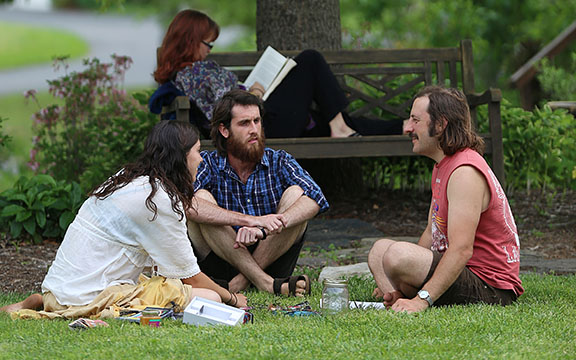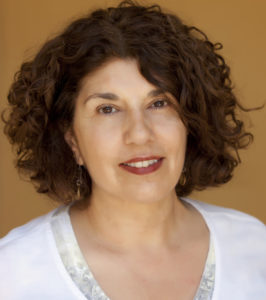 My discovery of Yoga and meditation when I was 18 and a college freshman began to change me from an angry and troubled teenager who hated Phys Ed. to a balanced adult comfortable in my body. It took years, of course, for the practices to take hold. But I stayed with them or, more accurately, returned to them in my 20s and 30s and 40s whenever I needed to be rescued from my negativity and destructive habits.
My discovery of Yoga and meditation when I was 18 and a college freshman began to change me from an angry and troubled teenager who hated Phys Ed. to a balanced adult comfortable in my body. It took years, of course, for the practices to take hold. But I stayed with them or, more accurately, returned to them in my 20s and 30s and 40s whenever I needed to be rescued from my negativity and destructive habits.
Then in my mid-40s, I stumbled into the Integral Yoga Institute (IYI) in New York City. The Hatha Yoga classes were a revelation. I knew the basic poses but the more subtle practices of deep relaxation and pranayama were newer to me. Never had I felt so peaceful and free, so spacious in body and mind, as I did floating out of the IYI. I became a teacher and ended up serving at the New York IYI for more than 20 years. There, I studied the Yoga Sutras and the Gita, read The Golden Present on a daily basis, and applied the teachings of Yoga to how I conducted my life—at least most of the time.
Sharing these practices and teachings with willing students is joyous and easy. More challenging is trying to convince some of the people in my life that the valuable lessons I learned about peaceful interactions and healthy lives might make their lives better—and mine easier if they would only become yogis! I was certain if only my husband would do just a few poses (selected by me, of course!) each day, his back pain would subside, and if he would only adopt some Raja Yoga teachings, we would argue less. If one of my oldest friends would calm down and practice some pranayama (“I already breathe!” she angrily replied to my admittedly sometimes pushy suggestions), her hips and shoulders would feel better and she would stop being angry and resentful in her life.
Bottom line: nothing worked on either of these dear people. Furthermore, my equanimity was actually sometimes a source of friction between us. In advocating for peace and health and comfort and love, I was perceived as a bit superior and off-putting.
What can we do as Yoga teachers and enthusiastic, dedicated practitioners to address the desire to share, the frustration of resistance, and the courtesy of honoring people where they are?
Here’s what I do, with varying degrees of effectiveness depending on the day. First, I go deeper into the practices of Integral Yoga that have literally transformed my own life. The daily practices. My body and mind depend on them and on the rare days that I miss, I am reminded why these are called “daily” practices.
Second, I try to look at every situation through the lens of all of the teachings to explore how I feel, what my mind is bringing up, and how I can use the great tool of a deep breath before responding to anything. With this foundation, I try to be humble, not a model or icon, but simply an example of the value of these teachings. When people say to me, “Oh, you look good,” or, “Oh, you seem happy and relaxed,” I have finally learned to merely reply, “That’s because I practice Yoga.” Following this sentence, I clamp my mouth shut to avoid saying, “You should try it.”
Though I can’t seem to get my folks to practice asana or breathe or meditate, I have had some success in improving our communication utilizing the skills of Yoga. It’s easier now for me not to answer a sharp remark with another one, not to visibly wear my feelings on my face, and even not to silently think a harsh thought. It’s easier for me to listen and to carefully choose my words when trying to convey something that is important to me in the hope that the clarity and precision we learn in Hatha practice can also apply to spoken thoughts. This almost always softens the other person because it takes two to fight.
Talking simply about stretching as a generic idea, without using the word Yoga, made some inroads with my husband. I notice he stretches more, not in any organized way, of course, but at least there’s a stretch now and then. As for my friend, I bought her a gift certificate for one session with a wellness practitioner who is also a Yoga Therapist, though again I did not use the word. She feels somewhat obligated to go. When she thanks me, I will say the best thanks would be for her to book a second (and third) session.
Questions for contemplation:
1. How have your own experiences in trying to share Yoga gone?
2. Why do you think people are so resistant to something you (and often they) know is so good?
3. What can you do to accept people where they are rather than where you want them to be?
About the Author:
 Chandra/Jo Sgammato is a certified Integral Yoga instructor who served for twenty years at the Integral Yoga Institute of New York in many capacities, mostly as general manager. She founded the Yoga At School program to bring the benefits of Yoga to New York City public schools. Today she is a member of the Integral Yoga Global Network.
Chandra/Jo Sgammato is a certified Integral Yoga instructor who served for twenty years at the Integral Yoga Institute of New York in many capacities, mostly as general manager. She founded the Yoga At School program to bring the benefits of Yoga to New York City public schools. Today she is a member of the Integral Yoga Global Network.

